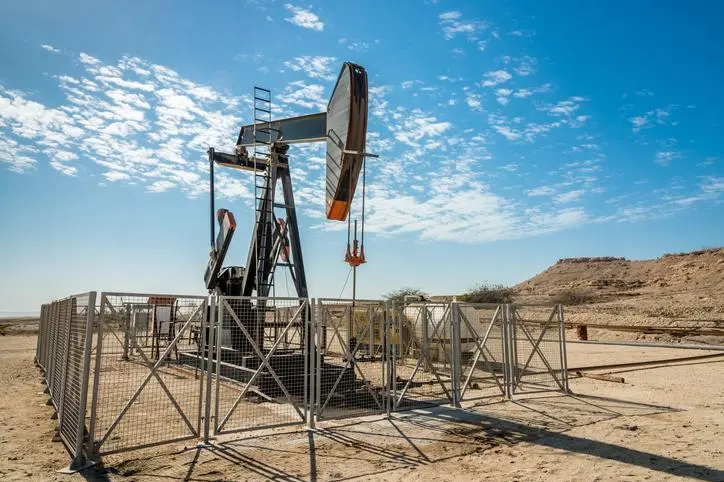PHOTO
- Oil prices rise again on Wednesday to hover near 2019 highs
- Asian shares rally again on trade deal optimism between the U.S. and China
- Dubai’s index adds gains, boosted by Emaar Properties
- Dollar weakens, gold edges lower stays near ten-month highs
Oil prices
Oil prices rose early on Wednesday to hover near their 2019 highs on tightening supply.
U.S. West Texas Intermediate (WTI) crude oil futures hit 2019 highs of $56.39 per barrel shortly after 0300 GMT on Wednesday, up 30 cents, or 0.5 percent, from their last settlement.
International Brent crude futures were at $66.58 per barrel, up 13 cents, or 0.2 percent, from their last close and not far off their 2019 high of $66.83 per barrel from Monday.
The Organization of the Petroleum Exporting Countries (OPEC) issued a list of oil production cuts by its members and other major producers for six months starting January 1, to boost confidence in its oil supply reduction pact.
OPEC said on Tuesday that it had reduced its output by almost 800,000 bpd in January to 30.81 million bpd.
Oil prices have also been boosted by lower supply from Venezuela, as the U.S. introduced petroleum export sanctions against state-owned Venezuelan energy firm PDVSA.
“We have lowered Saudi crude oil output in line with announcements ... (and) are now assuming that Saudi Arabia will produce in the first three quarters of 2019 less than the 10.31 million bpd target it agreed to at the Dec. 7 OPEC, non-OPEC meeting,” French bank BNP Paribas said in a note, according to a Reuters report.
Global markets
Asian shares rallied again on Wednesday on optimism over a trade deal between the United States and China.
Optimism that a trade deal could be reached between the U.S. and China received a boost last week when U.S. President Donald Trump said talks were going “very well”.
MSCI’s broadest index of Asia-Pacific shares outside Japan rose nearly 1.0 percent to reach its highest levels since October 2.
“They will likely agree on China importing a larger amount of natural gas and agricultural products,” Nobuhiko Kuramochi, chief strategist at Mizuho Securities told Reuters, adding that China will also “open up a part of its domestic financial services and possibly some manufacturing sectors”.
Middle East markets
Dubai’s index rose 0.6 percent on Tuesday, extending gains for a fifth straight session, with Emaar Properties, gaining 3.1 percent and its unit Emaar Malls rising 1.9 percent.
Abu Dhabi’s index edged down 0.1 percent with heavyweight First Abu Dhabi Bank slipping 0.3 percent.
Saudi Arabia’s index dropped 0.6 percent with Samba Financial Group dropping 2.2 percent and Riyad Bank shedding 2.1 percent.
Qatar's index was down 0.5 percent as Qatar National Bank fell 1.2 percent and Masraf Al Rayan dropped 1 percent.
Egypt’s blue-chip index EGX30 fell 0.5 percent as El Sewedy Electric shed 1.4 percent and the country's largest lender, Commercial International Bank lost 0.8 percent.
Kuwait’s premier market index added 0.7 percent, while Bahrain’s index rose 1 percent and Oman’s index dropped 0.4 percent.
Currencies
The dollar dropped early on Wednesday as investors were cautious before the Federal Reserve’s January minutes meeting.
The dollar index, which measures the greenback against a basket of six major currencies, was a touch lower at 96.451 after dropping about 0.4 percent overnight.
Precious metals
Gold prices held near ten-month highs on a weaker dollar, despite a marginal retreat early on Wednesday.
Spot gold was marginally lower at $1,339.61 per ounce as of 0021 GMT, having touched $1,341.78 per ounce in the previous session, its highest level since April 20.
U.S. gold futures dipped 0.2 percent to $1,342.6 an ounce.
(Reporting by Gerard Aoun; Editing by Mily Chakrabarty)
Our Standards: The Thomson Reuters Trust Principles
Disclaimer: This article is provided for informational purposes only. The content does not provide tax, legal or investment advice or opinion regarding the suitability, value or profitability of any particular security, portfolio or investment strategy. Read our full disclaimer policy here.
© ZAWYA 2019




















